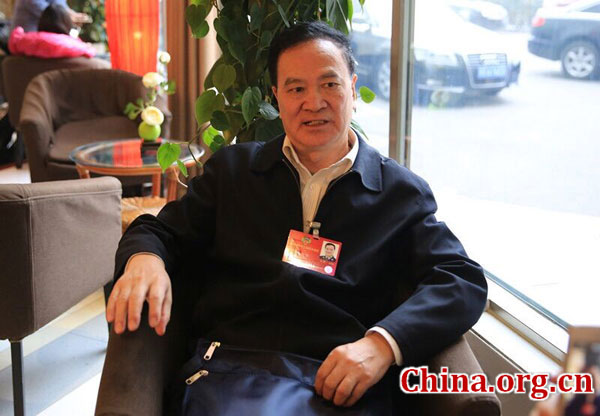General: Korean Peninsula in grave tension
- By Zhang Rui
 0 Comment(s)
0 Comment(s) Print
Print E-mail China.org.cn, March 5, 2016
E-mail China.org.cn, March 5, 2016
Major General Qian Lihua, a CPPCC National Committee member and former director-general of the Foreign Affairs Office of the Ministry of National Defense, told China.org.cn that the Korean Peninsula is possibly on the brink of war if confrontational parties don't remain calm and restrained.
"North Korea's nuclear issue is a very complicated, sensitive and ever changing regional security issue," Qian said. "North Korea conducted several nuclear tests and used ballistic missile technology to launch satellites despite protests from the international community. These violated the United Nations' resolutions and went against the goodwill of relevant regional countries. So, we must condemn it."
The UN Security Council has condemned, in the strongest terms, the DPRK's nuclear test of "a hydrogen bomb" on Jan. 6 and the satellite launch on Feb. 7, which it said used ballistic missile technology banned by previous UN resolutions. The new resolution passed on March 2 further tightened sanctions against the DPRK. Hours after the adoption, the DPRK fired off six short-range projectiles into eastern waters while the nation's leader Kim Jong Un said its military should be ready to use nuclear weapons at any time.
"We have to pay grave attention to the significance of timing," Qian said, "As North Korea has just conducted nuclear tests and launched a satellite, the United States and South Korea are scheduled to kick off their joint annual war drills, which could become the largest-ever in scale. So, in March and April, the peninsula will exist in a high-level of complication and sensitivity. If North Korea can be calm enough to deal with American and South Korean drills, while America and South Korea can maintain restraint and keep the drills at a certain scale without provoking North Korea even more, the possibility of conflict will remain low. On the other hand, we should also pay close attention to the development of the peninsula situation. Now, the situation is grave, and both confrontational parties are in great defense readiness. Any incidents or wrong signs could lead to war, lighting the fuse."
The general continued, "None of us want to see a war on the Korean peninsula. Even a small conflict will hurt China's interests. As a neighboring country, we will of course take some precautionary measures be there any war or chaos, but we do not hope it will go that way."
Qian is in Beijing attending the annual session of the 12th National Committee of the Chinese People's Political Consultative Conference (CPPCC), China's top political advisory body, in Beijing. More than 2,000 members of the advisory body are slated to discuss major political, economic and social issues during this year's session that will run until March 14.
The general admitted China and North Korea's relationship has been affected due to the nuclear issue, but "neighbors remain neighbors," he said, adding, "No matter how complicated and sensitive the diplomatic problems are, we have to sit down together and talk."
He reiterated that the nuclear issue is not a problem between China and North Korea and is not an outcome from the development and changes of the two nations' relationship. "That North Korea has developed a nuclear program comes from their desire to protect their own sovereignty and guard their national security. They want to talk directly to the United States, sign a peace agreement with the U.S. and develop a normal diplomatic relationship with the U.S. However, all the demands were turned down by America, which forced them to go further the other way."
But, he added, "To resolve the North Korean issue, regardless of whether or not it is a nuclear issue or an issue between countries, or an issue facing all of Northeastern Asia, we have all come down to one thing - negotiation and talks."
Fu Ying, spokesperson for the annual session of the National People's Congress, also addressed the North Korean nuclear issue yesterday at the session's first press conference, which echoed the general's opinion. Fu said that the new resolution is not a goal but a way to resolve the problem. "The resolution called for early resumption of the Six-Party Talks and a solution through diplomatic negotiations in a peaceful way, as China always insisted," she said, noting, "What is the essential problem of the North Korean nuclear issue? I would tell you it is a security issue. The Korean War ended more than 60 years ago, but there remains an armistice. And, there's no peace deal. So, in theory, relevant countries in that peninsula are still in a state of war.”
The National People's Congress session opens on March 5 and will last until March 16.







Go to Forum >>0 Comment(s)